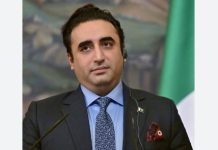ISLAMABAD, AUG 17 /DNA/ – The businessmen are in shock and expressed their serious concern over the hike in petroleum products in Pakistan despite the fact that crude oil prices have plunged to below $90 a barrel while the rupee has jumped by around Rs30 versus dollar during the last fortnight.
The BMP chairman and FPCCI former president Mian Anjum Nisar reiterated his demand of passing on relief of cut in oil prices in the global market to the industry, besides bringing key policy rate to a regionally competitive level.
On Monday night, the federal government announced a hike of Rs6.72 per litre in the price of petrol for the remaining days of August 2022, according to a notification issued by the Ministry of Finance.
He voiced his concern over the increase in fuel prices despite downward trend in international market. The present government came into power to give relief to the masses, which should be its top priority, as the hike in petroleum prices will trigger inflation in the country. He said that it was beyond comprehension that why prices were raised despite a reduction in oil prices at the international level, adding that the government should have mercy on poor masses and give them some relief.
Mian Anjum said when Russia invaded Ukraine last spring, energy experts were predicting that oil prices could reach $200 a barrel, a price that would send the costs of shipping and transportation into the stratosphere and bring the global economy to its knees.
Now oil prices are lower than they were when the war began, having dropped more than 30 percent in barely two months. The news of a slowing Chinese economy and a cut in Chinese interest rates sent prices down further, to less than $90 a barrel for the American benchmark. Gasoline prices have fallen every day over the last nine weeks, to an average of less than $4 nationwide, and prices of jet fuel and diesel are easing as well. That should translate eventually to lower prices for things so that cost of production could come down to a regionally competitive level.
Moreover, a large number of fuel stations remained closed nationwide despite no strike or shortage of petroleum products in the country. He said that oil marketing companies (OMCs) and petroleum dealers have allegedly created an artificial fuel crisis as the coalition government increased petrol prices by Rs6.72 per litre. Recent practices suggest they usually stop supplies of petrol and diesel to end-consumers for a couple of hours to make additional profit. However, this time around the suspension lasted for almost an entire day. Many petrol pumps had gone dry by Monday evening and new supplies came on Tuesday afternoon.
Federation of Pakistan Chambers of Commerce and Industry (FPCCI) former president demanded the government to reduce petroleum prices without any delay.
He demanded that the government should slash the prices of the petroleum products immediately as the international oil prices have substantively come down; and, the benefit needs to be shifted to the masses.
He noted with a sigh of relief that oil prices are now under $90 per barrel. The move will bring down the inflation in a much more effective and tangible manner than raising the interest rate to a 14-year high of 15 percent, he added.
Mian Anjum emphasized that the full force of the multiplier effect of the raise of the petroleum products has not yet materialized in Pakistan and inflation will keep rising in coming weeks if the relief from international market is not shifted to the end consumer.
FPCCI former chief explained that global macroeconomic sentiments are not optimistic and growth forecasts have been significantly lowered to the tune of being recessionary; and, the phenomenon may drive the international oil prices even lower than $90 per barrel in coming weeks. However, he maintained, we have to tread a cautious path and gradually but progressively lower the domestic petroleum prices.
The BMP Chairman called for the prudent and diligent regulation of the markets to allow the country to benefit from the downward trends in international oil prices, edible oils and initial signs of receding supply constraints in some other commodities.
He said that our industry already facing cut-throat competition in both national and international markets, as the industry was directly hit by the fluctuation of oil prices, which also directly increase inflation, he said. Its negative impact can be witnessed in the hike of cargo freight charges, which adds cost to the industrial production at all stages, he said.

















